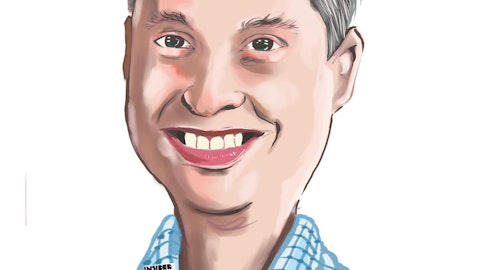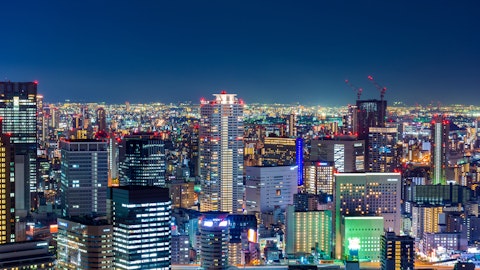So we would, of course, foresee ourselves exiting from those businesses on the other hand as well. And whether we would be happy to be making a new investment in China, I think we would remain to be pretty cautious. But in Asia, as well as in Australia, we would — we are very much looking forward to making new investments. So that’s about it. I hope this answers your question.
Mia Nagasaka: Yes. Thank you very much.
Operator: Thank you. Citigroup Securities, Niwa-san please.
Koichi Niwa: Thank you. This is Niwa from Citi. I have a question about M&A pipeline. According to the material used in the midterm announcement, for the second half of next year, you had JPY400 billion planned and the JPY300 billion, I think may be invested, but should we consider this pipeline still being built?
Hitomaro Yano: Well, thankfully, we are getting more and more new deals, which means well, it’s maybe lower than JPY300 billion, but it’s rebuilding once again. We don’t do everything and anything. We apply a cautious view, but also at the same time, we are adding more and more new deals into the pipeline, while applying a cautious view. As far as DHC is concerned, since it is a sizable investment and a certain number of people will be allocated and the management will be done also appropriately. That’s the current situation.
Koichi Niwa: If you could comment — DHC, I think this is a little bit different from your traditional investments. And using DHC as a trigger, do you think that will make a difference in terms of sourcing of deals and expanse of the deals or do you think it is basically the same as a traditional project? Can you maybe talk about the difference before and after DHC, if you can share some comments?
Hitomaro Yano: Depending on the size, of course, the players differ in any market. And the several tens of billion was the size that we have been doing. And now we are doing one that is a little bit bigger. So it’s not necessarily a question of whether there is a change. But anyway, would we do this? And if we’re successful, maybe we will do more of those. And we want to continuously expand our business, and this is the first step towards that. That’s how we see it.
Koichi Niwa: That was very informative. Thank you.
Operator: Thank you very much. UBS Securities, Okada-san, please.
Taiki Okada: I am Okada from UBS Securities. I have one question. As you have mentioned earlier, the outlook for USA, I would like you to follow up a bit. So I know that you are becoming a little more stringent in the control of businesses. But the segment profit of JPY105 billion is expected as well. So this profit outlook and also the risk management, how do you strike the right balance between the two? So going forward, like PE credit, real estate, what is your idea in the effort that you’ll be expecting in those areas? Please give us some more color.
Hitomaro Yano: Yes, as I have mentioned, as of today, so the profit that has declined. We don’t think the question, of course, you had asked is only, I think, justifiable because I think in two years, whether we will be able to recover back to JPY105 billion or not is to be questioned. We would not like to kind of changed the split. But if at all possible, we’d like to, of course, grow the businesses and whether we are going to give up on the businesses in the U.S., that is the answer to the question would be no. Although we will be become a little more stringent in terms of risk management, but we are continuing in the asset management businesses and the PE as well as credit and real estate businesses. So of course, making use of other people’s capital and using the leverage, we would very much like to continue to generate profit.



